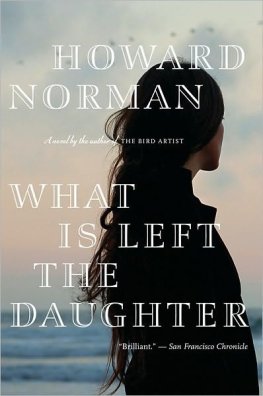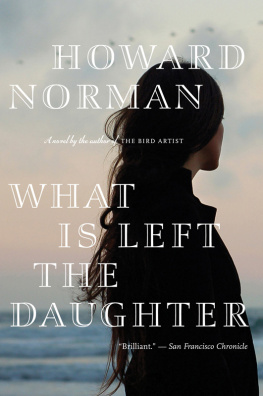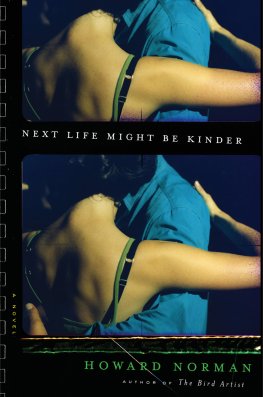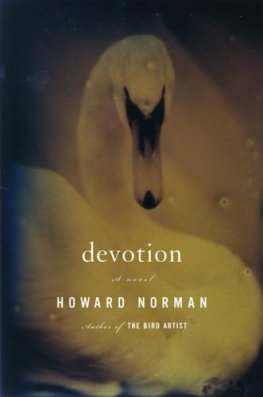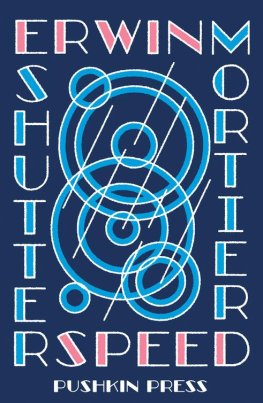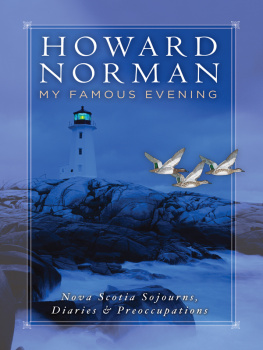Howard Norman
What Is Left the Daughter
I can't swim at all, and it is dangerous to converse
with an unaccustomed Element.
ERASMUS
What Is Left the Daughter
MARLAIS, today is March 27, 1967, your twenty-first birthday. I'm writing because I refuse any longer to have my life defined by what I haven't told you. I've waited until now to relate the terrible incident that I took part in on October 16, 1942, when I was nineteen.
Your mother, Tilda Hillyer, frequently consulted The Highland Book of Platitudes, which had 411 pages. She had it practically memorized. She found instruction and solace in that book, even the solution to certain puzzles about life. But I thought all those platitudes put together avoided the fact that life is unpredictable. For instance, after moving hotel to hotel here in Halifax for many years, I've finally returned to my childhood house at 58 Robie Street, which I never thought I'd set foot in again.
In fact, it's now three A.M. I scarcely sleep anyway and I'm writing at my kitchen table.
Two Sundays ago, I stopped in at Harbor Methodist Church. On occasion I do that. More out of nostalgia than present faith, to say the least. Anyway, when I entered the church Reverend Lundrigan was recounting some ancient parable or other in which an elderly woman listens to her son hold forth about how much heartbreak, sour luck and spiritual depletion can be packed into a life. But talk as he might, the man from the parable fails to address the one thing his mother is most curious about. "What of your daughter?" she asks. "Have you seen her? How is her life? Do not doubt that wonderment may be found when you find her again." Turns out, the man hasn't seen his own daughter in ages. "Rain, wind, hunger, thirst, joy and sorrow have visited her all along," the woman says. "Yet her father has not." She listens more, all the while experiencing a deeper and deeper sadness, until finally she says, "And what is left the daughter?" She doesn't mean heirloom objects. She doesn't mean money. She doesn't care about anything like those. She says, "I think you have a secret untold that keeps a distance between you and her and the life you were given."
Well, Marlais, you know how people talked in biblical times. Still, when I left the church, I thought, Strange how you can't predict during which happenstance you might take something to heart. And right then and there I understood that all I had to leave you, really, is what I'm writing here. I've read some of the English poet John Keats, and he said something to the effect that memory shouldn't be confused with knowledge. Of course, I have no way of knowing if, after you've read a paragraph or two, any curiosity you might've had will abruptly sour to disgust, or worse. Yet I hope you'll see these pages through. And that whatever else you may think, whatever judgments you come to, please at least accept the knowledge that I've always loved you, without cease.
How Your Father Became an Apprentice in Sleds and Toboggans in the Village of Middle Economy, Nova Scotia
In The Highland Book of Platitudes, Marlais, there's an entry that reads, "Not all ghosts earn our memory in equal measure." I think about this sometimes. I think especially about the word "earn," because it implies an ongoing willful effort on the part of the dead, so that if you believe the platitude, you have to believe in the afterlife, don't you? Following that line of thought, there seem to be certain people call them ghosts with the ability to insinuate themselves into your life with more belligerence and exactitude than others it's their employment and expertise.
My parents are such people. How else to describe it? Let me try. Last evening, for instance, I sat at the table. It was lightly raining. I was having a cup of tea, listening to a Beethoven quartet (Quartet No. 9 in C Major, my favorite) on the nightly classical radio program, when suddenly the broadcast was interrupted by static. Maybe I take things with the radio too personally, but I got the uneasy feeling I've felt this many times the static was really my mother's and father's indecipherable tidings from the afterlife. Were they trying to tell me something? What was the message?
I imagine that your mother informed you of this maybe she didn't but let me say it directly. My own mother, Katherine, and my father, Joseph, leapt from separate bridges in Halifax on the same evening. I was seventeen. Oh, it was quite the scandal. It made for bold headlines in the Halifax Mail (page two the day after it happened, page four the following day; the war was on, so most of the front page was reserved for Allied victories and setbacks, and Axis atrocities). So there I was, a spectacle for every Haligonian to pity, victim of a SORDID LOVE TRIANGLE, orphaned all of a single hour, on August 27, 1941, between six and seven o'clock, not quite dusk at that time of year, but almost. Odd as it might sound, the first thing I experienced, past the initial shock, was embarrassment. And when I returned to school the day after the funerals, I could hardly breathe for the shame and embarrassment of it all. That may not reflect well on me, but it's the truth. Of course, at night the weird sadness found me, and everything familiar to my life, absolutely everything, had suddenly become unfamiliar.
It's been twenty-six years, then, since my father leapt from the Halifax-Dartmouth Toll Bridge, connecting Highway 111 to the Bedford Highway, my mother from the toll bridge connecting North Street to Windmill Road. Rough waters that day under all bridges, Bedford Basin to Halifax Harbor, wild dark skies and gulls more catapulted and buffeted than flying here to there, all of which I could see from my high school on Barrington Street. Anyway, I keep the clippings in a mint-wood box. Among their headlines are UNUSUAL LOVE NEST RESULTS IN TWIN SUICIDES and MYSTERY WOMAN CAUSES FAMILY TRAGEDY.
Have you ever read the poet Emily Dickinson? She says that to travel all you need to do is close your eyes. Here at 58 Robie some nights, I close my eyes and I'm back on August 27, 1941, sitting on the porch when the first of two police cars pulls up in front of our house. Imagine, only ten or fifteen minutes before, I'd gotten a phone call telling me what'd happened. And here I'd been complaining to myself: Where is everybody? Am I going to have to make my own supper?
First page to last, The Highland Book of Platitudes, originally published in Scotland, does not contain a platitude that addresses a woman falling in love with a woman, and a man falling in love with the same woman. Yet that was the situation with my parents and this included our next-door neighbor Reese Mac Isaac. In 1941 Reese Mac Isaac was thirty-five years old. Her hair was the color of dark honey, she was slim and dressed smart, and was, to my mind, as lovely and mysterious as any woman you'd see in an advertisement for perfume in the Saturday Evening Post. My family didn't have a subscription, but you could find copies in the lobby of the Lord Nelson Hotel, on Spring Garden Road across from the Public Gardens.
In fact, Reese was employed as a switchboard operator at the hotel. Also, she'd taken acting lessons, and in 1937 had appeared in Widow's Walk. It was a picture about a woman whose husband's fishing boat capsizes in a storm on the same night she'd been dallying with the handsome village doctor. Out of guilt and remorse, the woman goes mad and spends the rest of her nights in a widow's walk atop her house. For the few months that it was being filmed, Widow's Walk was all the gossip. Referred to as "an all-Canadian production," most of it was shot near Port Medway they'd even built a temporary lighthouse.
In the heart of winter the following year,

